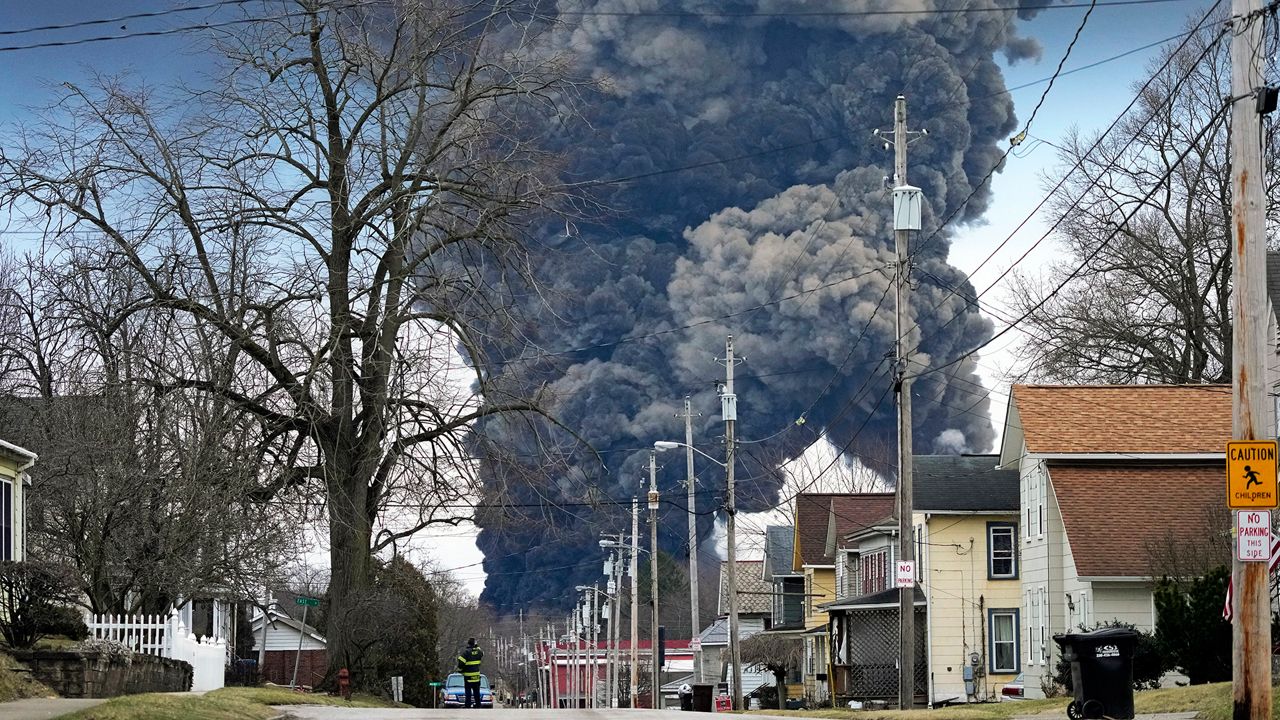The lawyers who negotiated a $600 million settlement with Norfolk Southern over that railroad's disastrous 2023 derailment in Ohio want residents to talk with them before deciding the historic deal isn't enough.
They said Wednesday that the settlement for everyone within 20 miles (32 kilometers) of the East Palestine disaster is bigger than any derailment settlement ever made public, including the worst in recent memory when a crude oil train rolled out of control downhill, killing 47 people in Lac Megantic, Canada, in 2013.
Apocalyptic images from the derailment in the small town on the Ohio-Pennsylvania border inspired calls for railroad safety reforms and exposed lasting fears for the community. Three days after a toxic mix of chemicals caught fire in the crash, officials unleashed a massive plume of black smoke over East Palestine when they blew open five tank cars of vinyl chloride and burned the chemicals because they feared an explosion.
On Wednesday, the lawyers moved to address residents' fears that the settlement wasn't enough, saying compensation would vary based on the severity of the derailment's impact on each person. Several residents said after the settlement was announced Tuesday that they worried the money, once divided among many, wouldn't be enough to cover potential future health care costs should they develop cancer later.
“This is not like your AT&T settlement where everybody gets two bucks. No, this is very individualized with respect to how close people were to the impact area, what their current situation is, whether they own, whether they rent — all sorts of criteria,” said Jayne Conroy, one of the lead attorneys with Simmons Hanly Conroy.
That formula dictating how much each person receives is still being written, they said. And a federal judge would have to grant the deal preliminary approval before those awards could be calculated.
The deal does include a provision to compensate people for person injuries. Accepting that money would preclude a future claim over cancer or some other horrible illness that might develop, but area residents can decline the health money and still receive a payment for property damage.
Mike Morgan, one of the other lead attorneys in the case with Morgan & Morgan, said this settlement wasn't really designed to compensate for crippling health problems that might emerge later. But he said none of the experts consulted during the litigation expect this derailment to lead to a huge cancer clusters even with all the chemicals that spilled and caught fire — or even the vinyl chloride intentionally released and burned three days later to prevent five tank cars from exploding.
Morgan said it's important to remember that this lawsuit wasn't about the massive cleanup costs that the railroad has already spent more than $1.1 billion on. There are separate lawsuits filed by the state and federal governments to address that.
Gas station owner Anna Doss said she's optimistic that this settlement will help the town move forward, though she's awaiting specifics of how the money will be divided up. Like many others in town, Doss is ready to put the derailment behind her although her business is struggling. She lost one quarter of her sales last year, and now her retirement plan is up in the air because her niece, who had planned to buy the businesses, moved away to Florida.
“We just pray that things go well and that everything that has been done is going to work to build a better community,” Doss said.
Of course, no one in East Palestine is immune from the fears that the derailment could lead to major health problems years from now. Tammy Tsai choked up when she said she and her husband decided to cash out their retirements to move away, fearful of staying in the “toxic community.”
“We’re fortunate that we have some retirements,” she said. “But what about the people that don’t? That want to get out of here, that are sick?”
The fact the settlement includes several larger towns around East Palestine had Tsai imagining residents walking away with only small pieces of the larger figure. She worries about any sickness worsening in future years and residents having difficulties getting compensated then.
She felt the settlement only benefited Norfolk Southern and would hardly make a dent in their pocket.
The railroad's CEO Alan Shaw acknowledged the deal would help remove some financial uncertainty for his company, but he argued during a presentation to investors Wednesday it would also be good for the town and help people recover.
“This gives monetary relief to individuals and qualifying businesses that they can apply in a manner to which they choose,” Shaw said. “What it really does is it addresses a lot of the financial exposure that was out there for Norfolk Southern and our shareholders, and takes that tail risk out of it.”
Transportation Secretary Pete Buttigieg said in a new op-ed Wednesday that what the country really owes East Palestine — more than monetary payments — is to make railroads safer. He again urged Congress to pass a package of reforms proposed after the derailment that would set tough standards for inspections and trackside detectors while giving authorities power to impose much bigger fines.
“If we get this right, their community will be known not only for the derailment that upended everyday life there, but for the lifesaving reforms that came next,” Buttigieg said.



